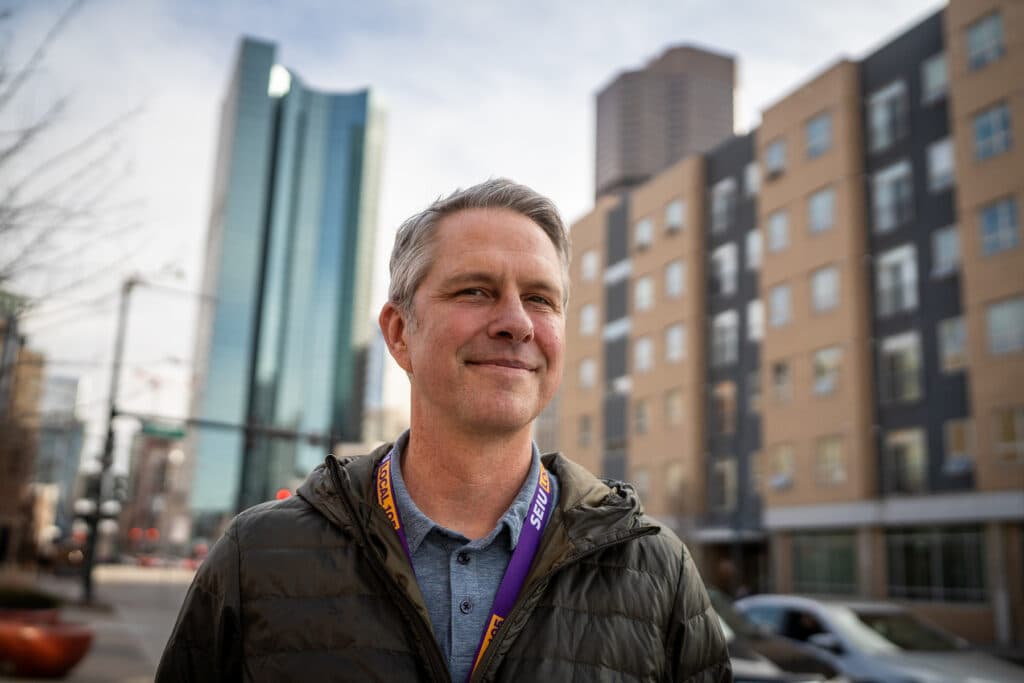Updated at 4 p.m. on Thursday, December 12, 2024.
The Colorado Coalition for the Homeless announced this week that the Service Employees International Union has filed to represent 78 of the 850 workers employed by the nonprofit. The union push began earlier this year following the unionization of other homeless services providers in Colorado.
Todd Kaanta, a case manager and union organizer, said he chose to work at Colorado Coalition for the Homeless seven years ago to make a difference in his community. It’s work that requires dedication and passion, but Kaanta says workers’ efforts aren’t always rewarded with fair pay.
“That is something that we hear again and again in the field is that the work and our passion for the work should be a substitute for fair payment, and I would absolutely dispute that,” he said. “I don’t think it’s an ‘either or’ thing. I think that we can be passionate about the work that we're doing and make a livable wage.”

According to the Coalition’s job postings, a case manager with a bachelor’s degree can make anywhere between $20.64 to $26.13 an hour, equating to annual salaries between $41,000 and $54,000.
The U.S. The Department of Housing and Urban Development considers a household to be "low income" if it earns less than 80 percent of the area median income. In Denver, that’s any household earning less than $66,300 per year.
“Some of our case managers and others in the organization are eligible for some of the benefits that the clients we serve are getting,” Kaanta said.
Cathy Alderman, the Coalition’s Chief Communications and Public Policy Officer, said the organization has taken several steps in the last few years to address compensation concerns, but they’re also facing a loss of overall funding as pandemic era support for health support and housing services come to a close.
“What we were able to do this year was increase the wages of those lowest paid workers – to get them above minimum wage,” she said. “We're advocating for housing resources every day, and we want to be able to support our workforce to make sure that they can live and work in Denver. It's a community-wide problem and one that we're going to be asking our funding partners, our government partners, and the community at large to help us with.”
The Coalition has faced a number of struggles in recent years, including an increase in uninsured patients, flat federal funding and growing homelessness in Colorado. It’s funded through housing subsidies, medicare reimbursements, and some grants, but Alderman says there are worries about potential cuts to existing funding ahead of the upcoming presidential transition.
“Based on our experience last time around, there were significant cuts proposed [during President-elect Donald Trump’s first term], and luckily none of those went through, but that would really impact our ability to deliver services,” she said.
Kaanta said while he believes better pay is deserved, that’s not the only reason leaders are seeking union representation. They also want the Coalition to be more competitive with peer organizations to decrease turnover and make the jobs more feasible.
“One of the biggest things with our customer service that I hear time and time again from our clients is that the staff turnover has been so great that they feel like they're constantly reliving their trauma when they have to break in a new case manager or a new therapist on a yearly or oftentimes less basis,” he said. “The turnover has [also] created a lot of burnout especially for the case managers that are just kind of starting off and making just $20 or a little bit more an hour and trying to pay their rent or mortgage on that wage.”
Kaanta believes union organizers and management ultimately want the same things.
“Our organization works for social and economic justice and I'm looking for it for my coworkers as well,” he said. “As a member of the organizing committee for CCH Workers United, I hope that we can work well with management to provide better and better services to our clients.”
Alderman says as the union election approaches, CCH aims to ensure all employees are educated about their ability to vote, regardless of where they stand on the issue.
“We think it's really important that everybody who is eligible is able to exercise their choice and how they want to be represented in employment matters,” she said.
The Coalition’s annual report for 2023 said the group served 75 percent of metro Denver's homeless population, which they estimated to be 30,000 people. That translates to about 22,500 people served last year.
Editor's note: This story has been updated to correct a typo in the number of unhoused people the Coalition serves.













